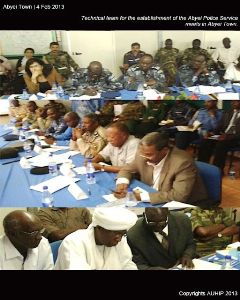Sudan and S. Sudan disagree on set-up of Abyei police service
February 4, 2013 (JUBA/KHARTOUM) – A technical team from Sudan and South Sudan on Monday failed to reach a compromise on the composition of the police force to be established in the disputed oil-producing region of Abyei.

Luka Biong Deng, South Sudan’s co-chair on the Abyei Joint Oversight Committee (AJOC), earlier told Sudan Tribune a team from the interior ministries of both countries were in Abyei to explore the “technical”, but not “political” issues related to the two countries.
“A technical team is in Abyei. They have started discussions. They are only discussing technical issues, but they do not have a mandate to decide on political issues,” said Deng.
He added, “They are discussing the size of the police. Sudan is proposing [a] 123 [strong] police force and we are proposing 930, because the status of Abyei as per the September proposal and political will in the south would be [as] a state, so it requires having a police force that runs services at the level of a state”.
Al-Faheem insists Juba’s requests for a 930 strong force was designed to topple the talks, adding that Khartoum was being flexible in order to set up the police force and achieve the implementation of the administrative arrangements in Abyei.
General Kuol Monyluak, who also represents South Sudan on the AJOC, confirmed the two sides held talks, but gave no details on what both parties discussed on bilateral relations.
“Yes, we started discussions. We exchanged ideas on the size of the police service. We also touched [on the] criteria of selection, but we did not take much time on it because we have to agree on the size of the police [force] first before we could move to another agenda,” Monyluak said by phone on Monday from Abyei.
The status of Abyei was supposed to be decided in a referendum in January 2011, but the two sides could not agree on the participation of Misseriya nomads in the vote.
Last year, the African Union (AU) mediation team proposed holding a referendum in Abyei next October, with only those residing permanently in the area allowed to vote in the plebiscite and decide whether they want to join Sudan or South Sudan.
This proposal would effectively mean the majority of voters would come from the Dinka Ngok tribe, aligned with South Sudan, thus putting the Arab Misseriya nomads, who spend several months in Abyei every year for grazing, at a disadvantage.
The mediators said that the exclusion of the Misseriya nomads was in line with the decision of the Hague-based arbitration court, which defined the territory of the Ngok Dinka’s nine chiefdoms in July 2009.
Sudan swiftly rejected the plan, which received the blessing of the AU Peace and Security Council (AUPSC), seeking referral of the matter to the UN Security Council (UNSC) to make it binding.
However, Khartoum insists it is confident its disputes with South Sudan can be resolved without the involvement of international bodies.
Sudan’s foreign minister, Ali Karti, recently said that the AU is capable of resolving the long-standing conflict without the need to resort to the UNSC.
(ST)
